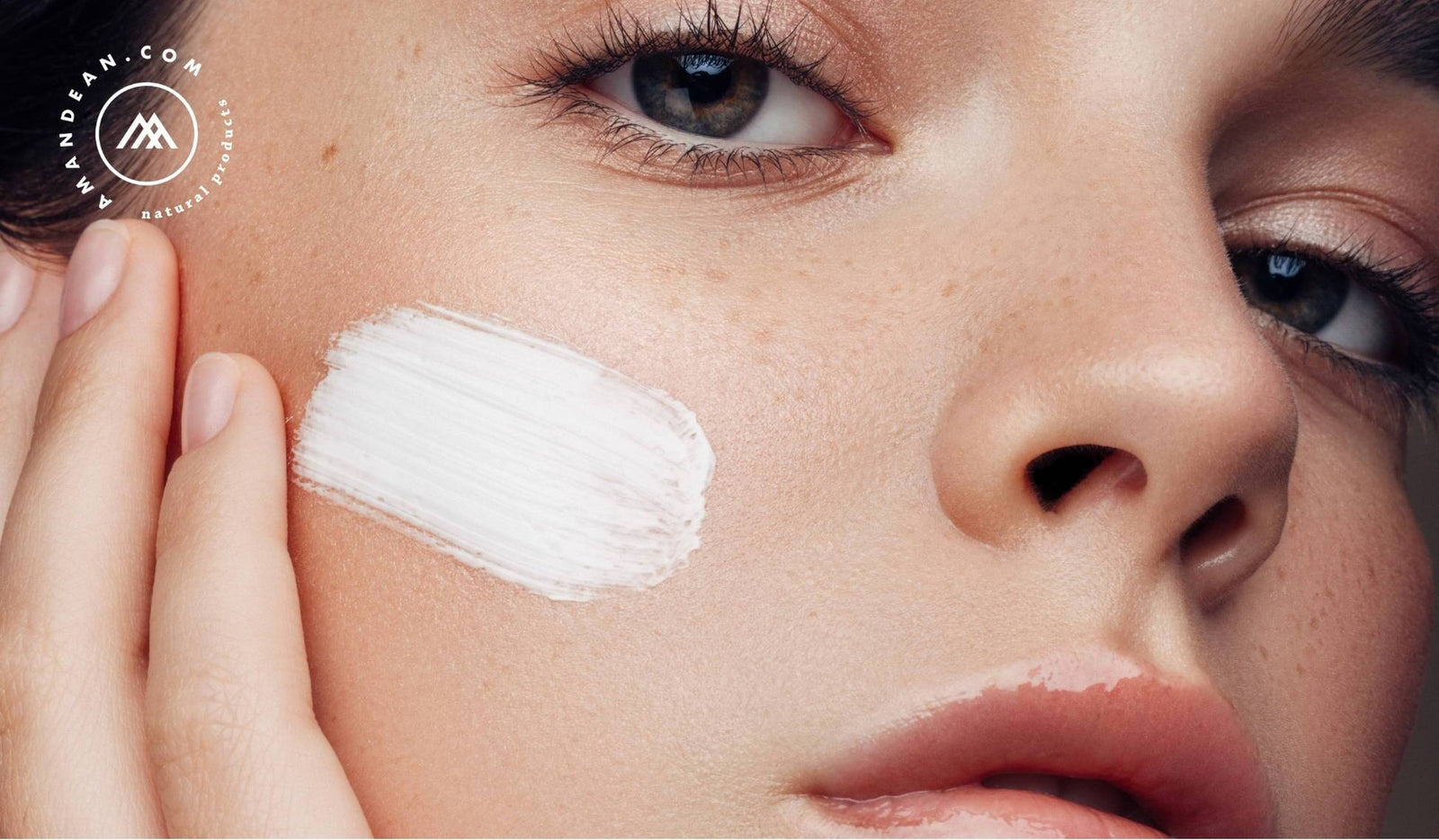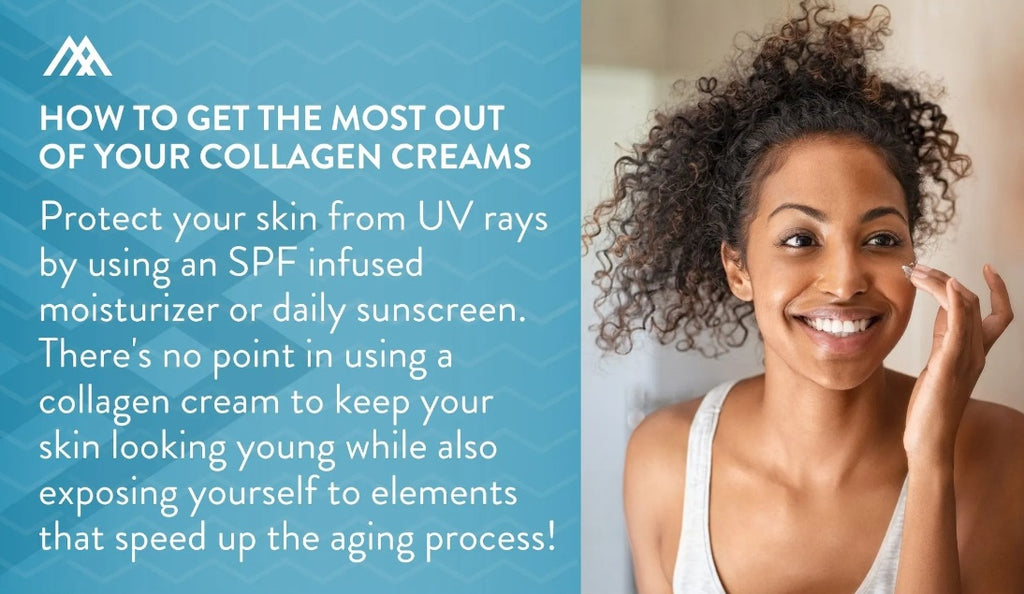Your Cart is Empty

October 08, 2020 5 min read
It's no surprise that collagen is taking over the skincare game. Collagen is the most abundant protein in the human body and is largely considered the most important protein too. Collagen holds us all together - literally - by creating and keeping all the connective tissues in our bodies healthy. Not only is collagen responsible for helping us to feel young by keeping our joints healthy and our muscles strong, it is crucial for keeping our skin feeling and looking healthy and young with its plumping, hydrating, brightening, and firming abilities.
Natural collagen is produced by the body, but how much collagen we produce slows with age. After the age of 30, our bodies lose approximately 1.5% of its collagen per year. Your nutrition and health history also play a part in your rate of collagen production. That's why many people reach for collagen supplements and skincare products to boost their collagen levels and add powerful anti-aging benefits to their skincare routines. The benefits of collagen on our skin elasticity and overall health have been proven when ingested orally with collagen supplements, but does collagen really belong in our skincare products? Let's find out.

Regardless of skin type, supplementing with collagen can decrease fine lines, dark circles around the eyes, dry skin, and sagging skin, while improving your overall skin tone by replacing dead skin cells. But buyer's beware - there are many skincare brands that will claim all of collagen's benefits can be achieved with just one gel or collagen cream alone. While collagen peptides may help the skin look better and tote some or all of these impressive benefits, there are things you need to look out for when shopping for a new collagen-infused cream at the drugstore or online.

The collagen molecule itself is actually too large to be absorbed through the skin, which is why so many people turn to collagen-rich foods and supplements to fight the first signs of aging. However, hydrolyzed collagen peptides are much smaller and bioavailable so that they can be absorbed deeply into the skin and used by the body. Peptides make up elastin fibers that help the skin look firm and taut, so make sure when you read over the ingredients label that peptides are included - the higher up the list, the better.
Secondly, look for paraben-free collagen moisturizers, lotions, night creams, or serums that have prolonged contact with your skin, leaving plenty of time for the product to soak in and hydrate the skin. Collagen doesn't just benefit the skin on your face, it can also tighten the skin on the body to fight cellulite. There are plenty of body lotions and collagen-deep creams on the market that can help you target cellulite. If you're particularly interested in brightening the eyes, try a collagen peptide-rich eye cream.
Lastly, there are other ingredients that act as an ally to collagen peptides. Peptides work well with vitamin C, antioxidants and amino acids, and hyaluronic acids. Retinol also supplements the moisturizing benefits of collagen, but you might have a harder time finding them together in one product. With that said, retinol can be harsh on sensitive skin and everyone's skin composition is different so make sure to consult your dermatologist to find what's right for you. Additionally, they should be able to guide your product search to ensure the product will do what it says, as “peptide” can sometimes be used as a marketing term.

Picking the right collagen cream is only part of the battle. There are certain things that can damage or deplete your collagen reserves as well as things you can do to supplement your collagen cream. To help your new collagen cream out, avoid smoking, consuming excess alcohol, getting too much sun exposure, and eating too many processed foods; all of these factors can deplete your collagen reserves and speed up signs of aging.
Instead, make sure to eat a diet that's rich in vitamin C, zinc, and copper. These three vitamins and minerals help create the amino acids necessary to produce more collagen. Antioxidants and vitamin E can also protect your skin from environmental factors such as free radicals. These can be found in foods like dark leafy greens, dark chocolate, citrus fruits, peppers, tomatoes, green tea, broccoli, meats, shellfish, and nuts and grains to name a few. You can also supplement with a bioavailable vitamin C to ensure that you're getting an adequate amount regardless of what's on the menu that day.

Protect your skin from UV rays by using an SPF infused moisturizer or daily sunscreen. There's no point in using a collagen cream to keep your skin looking young while also exposing yourself to elements that speed up the aging process!
Use a gentle cleanser and moisturizer daily to moisturize and clean the skin by removing dead skin cells. This helps take a load off of collagen so that it can work to provide more anti-aging benefits.
Lastly, and perhaps most importantly, add oral collagen supplements to your daily routine. Collagen supplements have been found to be more effective and bioavailable than topically-applied collagen. If you opt for a variety that is flavorless, paleo & Keto-friendly, as well as gluten-free, it will make it easy to fit into a healthy diet. Although there are not yet any vegan sources of collagen available, you can opt for a vegan-friendly collagen booster if your dietary preferences don’t allow for fish or beef. When it comes to skincare, marine collagen from wild-caught fish has powerful anti-aging effects such as increasing skin hydration, decreasing the formation of deep wrinkles and improving the skin’s elasticity. It's a fast, simple, and effective way to boost the efficacy of your collagen cream by supplying the body with more collagen from the inside-out.
As a general rule of thumb, if you want your skin to retain its youthful texture and glow, you have to supplement with collagen from the inside out. Don't be fooled by flashy products that claim to have "rapid collagen infusion" without the evidence to back it up! As with all health tips, there is rarely one magic product that works alone. You can always help your skin out and make sure you're getting the most from your collagen creams by first choosing the right product, eating a healthy diet, and supplementing with collagen where you need it most!
After the age of 30, our bodies lose approximately 1.5% of their collagen stores per year.
Supplementing with collagen can decrease visible signs of aging, such as fine lines, dark circles, and dry skin.
Collagen molecules are too large to be absorbed through the skin, which is why an oral collagen supplement is the most effective formula.
In order to preserve the collagen in your body, avoid smoking, excess sun exposure, processed foods, and excess alcohol consumption.
Take our quiz and find which supplements your body is craving.


October 17, 2025 8 min read
Find out why creatine is better for vegans! Boost your wellness game and unlock peak performance with Amandean's premium supplements today.

October 16, 2025 7 min read
Learn whether collagen in coffee is just another wellness fad. Examine the facts, benefits, and how to use collagen in coffee for beauty and joint support.

September 22, 2025 9 min read
Unlock the full benefits of creatine for women. Boost energy, beauty, and brainpower with Amandean’s clean formulas.